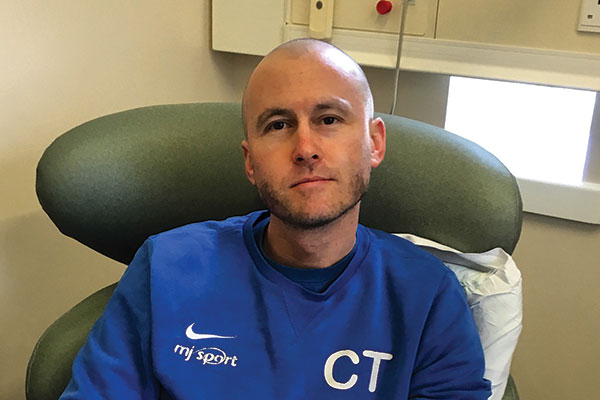What’s Chemo Like?
My experience as a lymphoma survivor enduring more than two years of chemotherapy
by Chris Tueart
After my diagnosis of follicular lymphoma and diffuse large B-cell lymphoma, my doctors suggested a treatment plan that included an initial course of chemotherapy, followed by radiotherapy, and then two years of maintenance chemotherapy consisting of 12 bimonthly injections. I realized early on that cancer treatment – chemotherapy – was now a part of my life. I wasn’t going to have a few weeks of treatment and then just move on. Chemotherapy became my new normal.
On my first day of chemo, I wasn’t afraid, I wasn’t nervous; I was oddly excited. You see, when I first learned I had cancer, I decided right then to look at my recovery and survival as a series of challenges. Daily match-ups between me and cancer. And getting through Day 1 of chemo was another battle for me to win.
Preparing for Chemo
I prepared for the treatment like it was a cup final, a triathlon, an important presentation, a job interview. I like to think that if we control all the controllable factors in any given situation, then the outcome is more likely to be favorable. With that said, here are my top five tips to help you prepare for chemotherapy (or any type of medical appointment, really):
- Write a list: a to-do list, a list of questions, a timetable, a list of what to pack in your hospital bag. Whatever you need, write it down.
- Eat well, and stay hydrated. I can say from experience that I could feel the difference when I didn’t drink enough water before a chemo infusion. Being dehydrated had a huge effect on me. Granted, I’m not a nutritionist, but it’s common knowledge that a healthy, balanced diet is essential for cancer recovery.
- Sleep well. When you’re under-going chemotherapy, I say sleep whenever you need to, even if that means taking a nap in the middle of the day.
- Set your alarm for when you need to get up. Don’t hit snooze.
- Get your stuff ready the night before. Lay out the clothes and equipment you’ll need, including socks and underwear. Pack your bag for the day ahead, and place it near the door. The less you have to think about in the morning, the more you can focus on the important things, like getting yourself into a positive frame of mind.
Now, Let’s Talk About the Side Effects
After each chemo treatment, my side effects tended to follow a pattern: nausea and discomfort, insomnia, increased susceptibility to infection, constipation, and then fatigue. Now, I’m not talking about the fatigue you experience after a triathlon. You can’t even compare it to the tiredness you feel after a late night out or a busy week at work. It’s nothing like any other tiredness I’ve ever experienced, not even jetlag. It’s a tiredness that permeated my bones. I felt like I could have slept on a washing line.
To help with the fatigue, I tried to exercise whenever possible. Before cancer, exercise meant a 50-mile bike ride, followed by a 5-mile run or 90-minute weightlifting session. However, during chemotherapy, walking was all I could manage. It would often leave me breathless, but was always invigorating. Walking in the sunshine lifted my spirits and helped me feel closer to recovery than anything else.
On Getting Back to “Normal” Life
Before starting chemo, I was keen to keep working. I expected I would take off work for my first chemo cycle and then get back to normal life. I now realize that that would have been incredibly foolish. In fact, just two or three treatments in, it dawned on me that I would have really struggled to get through this if I hadn’t given it my all. Besides, since I worked in schools, the risk of picking up an infection was too great to risk it.
Here’s what I say to anyone who is feeling conflicted about returning to work before you’re ready: Your work will be there when you’re better. Trust me, no one loves working more than I do, and I missed my students and my colleagues very much, but I know I made the right decision in taking time off.
Here’s what I know. We, as cancer survivors, must focus on what is important – and that is getting stronger and becoming well. We may only get one shot at it. And when it comes to beating cancer, nothing else matters.
Chris Tueart is a cancer survivor living in Northumberland, United Kingdom. Find out more about Chris at ChrisWithaCBlog.wordpress.com.
This article was published in Coping® with Cancer magazine, September/October 2017.
Everyone has a unique story to share. Do you want to share your survivor story? We consider a cancer survivor to be anyone living with a history of cancer – from diagnosis through the remainder of life. Here are our submission guidelines.



Pingback:Losing My Hair and Finding Myself - Felicia Carparelli